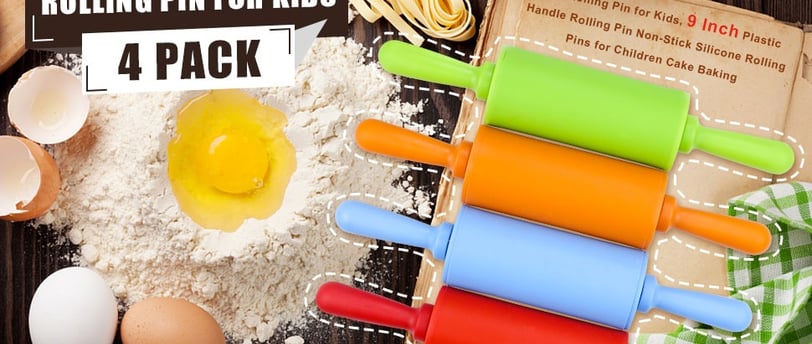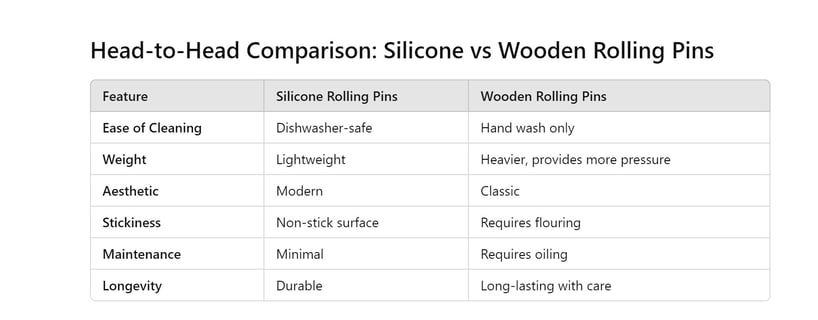We accept wholesale customized service,feel free to contect with us:whatsapp:+8613392817215
Silicone vs Wooden Rolling Pins: Which One Wins?
When it comes to rolling pins, the debate between silicone and wooden options sparks curiosity among bakers. Both have their loyal fans and unique advantages, but which one truly takes the crown? In this guide, we’ll compare silicone and wooden rolling pins to help you make an informed choice based on your baking style and needs.
Annie
12/3/20243 min read


When it comes to rolling pins, the debate between silicone and wooden options sparks curiosity among bakers. Both have their loyal fans and unique advantages, but which one truly takes the crown? In this guide, we’ll compare silicone and wooden rolling pins to help you make an informed choice based on your baking style and needs.
Why Choosing the Right Rolling Pin Matters
Rolling pins are more than just kitchen tools—they’re essential to creating perfect pastries, cookies, and breads. The type of rolling pin you use can affect your dough's consistency, texture, and ease of handling. This is why understanding the differences between silicone and wooden rolling pins is crucial.
Silicone Rolling Pins: The Modern Choice
Features and Benefits
1.Non-Stick Surface
Silicone rolling pins have a non-stick coating, making them ideal for sticky doughs like sugar cookies or pizza crust.
2.Lightweight and Easy to Use
These pins are lightweight, reducing hand fatigue during prolonged use.
3.Easy Maintenance
Silicone pins are dishwasher-safe and require minimal cleaning effort.
4.Temperature Resistance
They handle extreme temperatures, making them versatile for various recipes.
Drawbacks
.Less Weight
Their lightweight nature can be a disadvantage when working with firmer doughs, as more pressure may be needed.
.Modern Aesthetic
Some bakers prefer the traditional feel of wood over the contemporary look of silicone.
Wooden Rolling Pins: The Traditional Favorite
Features and Benefits
Natural Feel and Control
Wooden rolling pins offer excellent control over dough thickness and texture.
Versatility
Ideal for all types of dough, from pies to pasta.
Durability
With proper care, wooden rolling pins can last for decades.
Timeless Appeal
Their classic design adds charm to any kitchen.
Drawbacks
Maintenance
Wooden rolling pins require hand washing and periodic oiling to prevent cracks and drying.
Stickiness
Dough can sometimes stick to wood, especially if it isn’t properly floured.
Frequently Asked Questions
1. Which rolling pin is better for beginners?
For beginners, silicone rolling pins are often recommended due to their non-stick surface and ease of cleaning.
2. Can a wooden rolling pin handle sticky dough?
Yes, but it requires more preparation. Generously flouring the pin and dough can reduce sticking.
3. Are silicone rolling pins durable?
Absolutely. Silicone is resistant to cracking, chipping, and warping, ensuring longevity with minimal maintenance.
4. Is one type better for specific recipes?
Wooden pins excel in tasks requiring precision, such as rolling pie crusts or pasta dough.
Silicone pins are ideal for sticky, delicate doughs like sugar cookies or fondant.
Who Wins? It Depends on Your Baking Style
Choose Silicone If:
You prioritize convenience and easy cleaning.
You often bake sticky or delicate doughs.
You prefer lightweight tools.
Choose Wood If:
You love traditional baking tools with a classic feel.
You need precise control over dough thickness.
You’re willing to invest time in maintenance.
Real-Life Examples: Bakers Share Their Preferences
Anna, a Home Baker: “I use a silicone rolling pin for my sugar cookies—it’s a lifesaver during the holidays!”
James, a Pastry Chef: “My wooden French rolling pin is my go-to for croissants. It gives me the control I need.”
Samantha, a Novice Baker: “I started with silicone because it’s so easy to clean, but now I’m experimenting with wood.”
Conclusion: Which One Should You Choose?
The debate between silicone and wooden rolling pins ultimately comes down to personal preference and baking needs. Silicone is the clear choice for convenience and ease, while wooden rolling pins shine in precision and tradition. Whichever you choose, a high-quality rolling pin can elevate your baking game.


Contact us
Email:szchuangqi@gmail.com
Phone:13392817215
Whatsapp:13392817215
Adress:5/F,Xingxiang Building,No5057 Songbai Road,Matian Community,Guangming District,Shenzhen,China.
Earning Disclaimer
My site participates in various affiliate marketing programs,which means that by making purchases through our links to retailer'websites,we get a commission!
